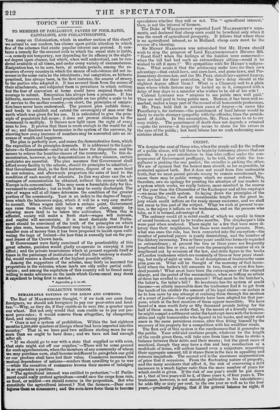COLLECTIVE WISDOM.
REMARKABLE SAYINGS OF THE LORDS AND COMMONS.
The Earl of MALMESBURY thought," if we took our corn from foreigners, we should ask foreigners to pay our poor-rates and land- tax."—Why, so they do, if they enable us to save 20s. a quarter upon our wheat. But not only would that sum enable us to pay our pre- sent poor-rates ; it would remove them altogether, by cheapening food, and raising profits. " Ours is not a system of prohibition. Within the last eighteen months 2,200,000 quarters of foreign wheat had been imported into this country.' That s, we have paid two millions sterling more for our corn than we ought to have done ; and we have not had enough after all.
"If we should go to war with a state that supplied us with corn, that state might cut off our supplies:'—There will be some ground for such apprehensions, when the members of any community of whom we may purchase corn, shall become indifferent to gain4when our gold or our produce shall have lost their value. Commerce increases the mutual dependence of nations—renders them unwilling to go to war —while the cessation of commerce lessens their means of indulging ins° expensive &pastime. "The agricultural interest was entitled to protection."—If Parlia- ment could really protect agriculture—could save the crops from rain, or frost, or mildew—we should concur in the proposition. But who constitute the agricultural interest? Not the farmers.—Dear corn injures them as consumers; and the corn-laws force them to become speculators whether they will or not. The " agricultural interest," then, is not the interest of farmers.
The Duke of WELLINGTON repeated Lord MALMESBURY'S argu- ments, and declared that cheap corn could be beneficial only when it was the result of agricultural prosperity. It follows that' where there is no agricultural interest, as in Holland, cheap corn must be the reverse of a blessing. Sir HENRY HARDINGE was astonished that Mr. lima should wish to stop the progress of Lord ELLENBOROUGH'S Divorce Bill. "Good God ! when the feelings of the families were concerned— when the bill had had such an extraordinary sifting—could it be wished to sift it more ?" We sympathize with Sir HENRY'S indigna- tion. What avails it that the aristocracy make laws for their own advantage—that entail-laws, and corn-laws, and game-laws, and Par- liamentary divorce-law, and (as Mr. PEEL stated) laws against forgery, were devised for their protection, if the law's delay should in the slightest degree affect them ? What is a Chancery suit to a plain man whose whole fortune may be locked up in it, compared with a delay of four days to a minister who wishes to be rid of his wife ? Colonel LINDSEY was "anxious to see public men well paid." They are well paid in being public men. Honour, it has been well re- marked, makes a large part of the reward of all honourable professions. Mr. PEEL held that in certain cases of forgery—in cases like Fauntleroy's, for instance—the punishment of hard labour would be likely to excite stronger sympathy with the offender, than the punish.. ment of death. In this assumption, Mr. PEEL seems to us to err very widely. The punishment of death does not degrade a criminal —quite the reverse—it frequently seems to atone for his errors in the eyes of the public ; but hard labour has no such redeeming asso- ciations about it.


































 Previous page
Previous page